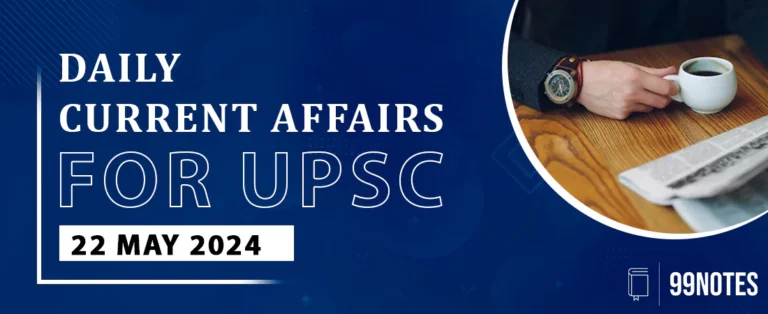25 May 2023 : Daily Current Affairs
DAILY CURRENT AFFAIRS
25-May-2023
Daily Current Affairs For UPSC ,Daily Current affairs of The hIndu and Indian Express.
1. Five-time MLA Khader elected Speaker of Karnataka Assembly
Topic: GS2 – Indian polity.
Context:
-
-
-
U.T. Khader, a five-time Congress MLA, has been elected as the Speaker of the Karnataka Legislative Assembly.
-
He is the 23rd Speaker of the Legislative Assembly and the first Muslim to hold the post in Karnataka.
-
-
Issue:
Procedure for election of Speaker of legislative assembly:
-
-
-
Nomination: The ruling party or coalition nominates a candidate for the position of Speaker. The candidate is usually a senior member of the party with sufficient experience and support.
-
Proposing and Seconding: A member of the ruling party proposes the name of the candidate, and another member second the proposal. The proposal and seconding are usually done during a formal session of the Legislative Assembly.
-
Voting: After the nomination, the members of the Legislative Assembly vote to elect the Speaker.
-
Majority Requirement: The candidate needs to secure a simple majority of votes to be elected as the Speaker. If there is only one candidate, and no other nominations are made, the candidate is usually declared elected unopposed.
-
-
2. On copyright infringement and AI.
Topic: GS3 – Science and technology.
Context:
-
-
-
The recent U.S. Supreme Court decision in the Andy Warhol Foundation for the Visual Arts Inc. versus Goldsmith et al. case has added unpredictability to the process of determining copyright infringement liabilities and has implications for regulating generative artificial intelligence (AI).
-
-
Issue:
-
-
-
Copyright law protects artists’ work and provides exclusive rights over their creative output, balanced with exceptions for users of the work.
-
The U.S. courts consider four factors to determine fair use: the purpose and character of the use, the nature of the copyrighted work, the amount and substantiality of the portion taken, and the effect on the potential market.
-
The first factor, whether the use is “transformative,” is often given the highest importance in fair use cases.
-
The Andy Warhol Foundation case involved the use of a photograph by Lynn Goldsmith by Andy Warhol. The district court ruled in favour of fair use, but the Court of Appeals reversed the decision. The U.S. Supreme Court later ruled that if the original work and the secondary work have similar purposes and the secondary use is commercial, the first factor may not favour fair use.
-
This decision could impact generative AI tools that rely on training models on copyrighted material. Courts may be more likely to rule against such tools as fair use if they produce outputs similar to copyrighted works and serve similar purposes.
-
The reliance on the commercial nature of the use may deviate from the established view that commercial use alone cannot negate fair use.
-
The implications for Indian copyright law may be limited, as India follows a different framework of exceptions called fair dealing and has a long list of enumerated exceptions. However, the observations from the U.S. Supreme Court decision could have a persuasive effect when determining fairness in fair dealing litigation in India.
-
-
3. Independence of the judiciary is part of the basic structure of the Constitution: SC
Topic: GS2 – Indian polity.
Context:
-
-
-
The Supreme Court of India has held that the independence of the district judiciary is part of the basic structure of the Constitution.
-
-
Issue:
-
-
-
Judicial independence requires the judiciary to have a say in matters of finances to ensure impartiality and independence from the executive and legislature.
-
The district judiciary is the court most accessible to litigants and plays a crucial role in the justice administration system, handling a significant number of cases.
-
The Supreme Court issued directions to amend service rules of the district judiciary and ensure payment of arrears of pension, additional pension, gratuity, and other retirement benefits.
-
The court-appointed Second National Judicial Pay Commission’s recommendations were the basis for these directions.
-
The district judiciary is considered the backbone of the judicial system, and financial security and economic independence are important to ensure the impartiality of judicial officers.
-
The court emphasized the doctrine that the judiciary must possess the power to compel payment of reasonable and necessary sums of money to carry out its mandated responsibilities, which is essential for the independence of the judiciary.
-
-
4. GDP growth expected to exceed 7% estimate in FY23, says RBI Governor.
Topic: GS3 – Indian economy.
Context:
-
-
-
Reserve Bank of India (RBI) Governor Shaktikanta Das stated that India’s GDP growth for the fiscal year 2022-23 may surpass the earlier estimated 7%.
-
-
Issue:
-
-
-
Retail inflation is expected to go below the 4.7% mark this month.
-
Gross non-performing assets(GNPA) in the banking system are likely to have further decreased in the January-March 2023 quarter.
-
The RBI’s growth expectation of 6.5% for the current year is higher than the International Monetary Fund’s projection of 5.9%.
-
Private investment revival is observed in sectors like steel and cement, and capacity utilization in manufacturing is higher than previously estimated.
-
Inflation has moderated, but caution is necessary, considering the evolving global situation and unforeseen events.
-
The monetary policy review will depend on the evolving ground situation.
-
Unaudited results suggest that gross non-performing assets are lower than the 4.4% recorded as of December 2022, but audited figures are awaited.
-
-
5. India set to triple the speed of its fastest supercomputers
Topic: GS3 – Science and technology.
Context:
-
-
-
India plans to significantly enhance its supercomputing capabilities by installing an 18-petaflop system this year, according to Earth Sciences Minister Kiren Rijiju.
-
-
Issue:
-
-
-
Flops (floating point operations per second) indicate the processing speed of computers, and a petaflop represents 1,000 trillion flops.
-
The new supercomputers will be housed at the Indian Institute of Tropical Meteorology, Pune, and the National Centre for Medium-Range Weather Forecasting (NCMRWF), Noida.
-
The machines are imported from the French corporation ATOS, with a deal signed in December 2018 between India and France.
-
The current most powerful supercomputers in India, Pratyush and Mihir, have a combined capacity of 6.8 petaflops.
-
The new systems are expected to cost around ₹900 crore and will allow for higher resolution mapping of weather and climate changes, leading to more accurate local forecasts.
-
The fastest high-performance computing system in the world is currently the Frontier-Cray system at Oakridge National Laboratory in the United States, with a peak speed of one exaflop (or about 1,000 petaflops).
-
-
6. The global body keeps NHRC waiting over ‘political meddling’.
Topic: GS1, GS2.
Context:
-
-
-
The Global Alliance of National Human Rights Institutions (GANHRI) has deferred the National Human Rights Commission, India (NHRC-India) accreditation for the second time in a decade.
-
-
Issue:
-
-
-
GANHRI cited objections such as political interference in appointments, involving the police in probes into human rights violations, poor cooperation with civil society, lack of diversity in staff and leadership, and insufficient action to protect marginalised groups.
-
The move follows objections raised by seven human rights institutions regarding the NHRC’s lack of independence, pluralism, diversity, and accountability, contrary to the United Nations’ principles on the status of national institutions (the “Paris Principles”).
-
The NHRC, India has held ‘A’ Status accreditation since the beginning of the accreditation process for National Human Rights Institutions (NHRIs) in 1999, with postponements in 2006, 2011, and 2017.
-
Amnesty International, Christian Solidarity Worldwide, Front Line Defenders, Human Rights Watch, International Commission of Jurists, International Federation for Human Rights, and World Organisation Against Torture wrote a letter to GANHRI expressing concerns about the NHRC’s regression in function and independence since 2017.
-
The NHRC-India responded that the deferment is an action of the sub-committee on accreditation and not a recommendation on its accreditation status. The re-accreditation process is ongoing, and the NHRC retains its A’ Status and associated privileges.
-
The sub-committee has recommended advocating with the government and MPs for legislative amendments to improve compliance with the Paris Principles, and the NHRC has provided satisfactory replies to most of the issues raised. The NHRC will further submit its response to the sub-committee.
-
-
7. Bulgarian writer wins International Booker Prize.
Topic: GS1.
Issue
-
-
-
Bulgarian writer Georgi Gospodinov and translator Angela Rodel have won the International Booker Prize for their novel “Time Shelter.”
-
“Time Shelter” is a darkly comic novel that explores the dangerous allure of nostalgia.
-
The book depicts a clinic that recreates the past, with each floor representing a different decade.
-
Originally intended to aid people with dementia in recollecting their memories, the clinic has become a popular destination for individuals seeking an escape from the modern world.
-
The International Booker Prize recognizes translated fiction from around the world.
-
-
About the International Booker Prize:
The International Booker Prize, formerly the Man Booker International Prize, is an annual literary award that recognizes outstanding works of fiction translated into English. It is awarded to both the author and translator of the winning book. The prize aims to promote international fiction and celebrate the art of translation.
8. WTO reforms an urgent and top priority for India, says Minister Patel
Topic: GS3 – Indian economy.
Context:
-
-
-
Anupriya Patel, Minister of State for Commerce and Industry, has highlighted the urgent need to address World Trade Organisation (WTO) reforms.
-
-
Issue:
-
-
-
India has advocated for WTO reforms and improved dispute settlement mechanisms during G20 talks.
-
The discussions will focus on reaffirming the foundational principles of the WTO and promoting open, fair, inclusive, and transparent global trade.
-
Patel emphasized that the WTO plays a vital role in ensuring fairness and transparency in global trade and serves as the backbone of the multilateral trading system.
-
Som Parkash, Minister of State for Commerce and Industry, mentioned India’s aim to become a global leader in international trade and highlighted India’s position as the second-largest e-commerce market worldwide.
-
-
9. Making agri-commodity value chains sustainable is tough.
Topic: GS3 – agriculture.
Issue:
-
-
-
India has a long history of producing agricultural commodities and has seen significant growth in the high-value agrarian sector over the last three decades.
-
Sustainability in commodity value chains has become a focus, acknowledging the sector’s contribution to environmental degradation, carbon emissions, and water and chemical misuse.
-
Agricultural commodities primarily grown for international markets, such as soybean, cocoa, coffee, tea, rubber, palm oil, and cotton, pose global sustainability challenges due to deforestation, biodiversity loss, freshwater depletion, and soil degradation.
-
India should expand its understanding of agricultural commodities to include actively imported commodities like oilseeds and those produced for both domestic and international markets like fruits, vegetables, rice, and cotton.
-
The multi-dimensional challenge of ensuring environmental sustainability in commodity value chains includes market and producer characteristics, production nature, governance mechanisms and policies, and addressing working conditions and labour rights.
-
Nudges and policies can be implemented based on market and producer characteristics to have a significant impact, considering export policies, consumer preferences, and regulations.
-
Agri-businesses can be driven by sector-wide sustainability commitments and standards, while smallholders can benefit from low-cost certification and policy action to raise production and sourcing standards.
-
Interventions should consider the nature of production, adopting better land-use strategies, improving seeds and inputs, and focusing on climate, biodiversity, and livelihood benefits.
-
Strong governance mechanisms and policies can support value chains through subsidies, market access, and infrastructural support, while targeted regulation can incentivize reporting and reducing environmental consequences.
-
The inclusion of marginalized actors, and addressing working conditions, labour rights, and climate crisis effects is crucial for the success of environmental sustainability initiatives.
-
Coordinated action, support systems, equity, and justice considerations can positively impact agricultural commodity value chains, delivering benefits for India’s people and the environment.
-
-
For Enquiry

25 May 2023 : Daily Current Affairs
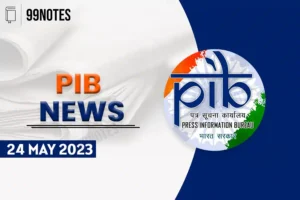
24 May 2023 : PIB
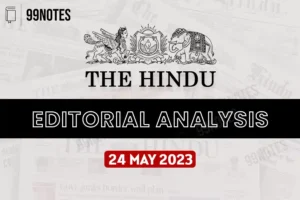
24 may 2023 : The Hindu Editorial
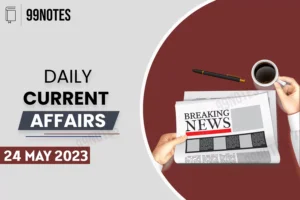
24 May 2023 : Daily Current Affairs
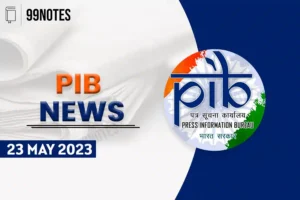
23 May 2023 : PIB
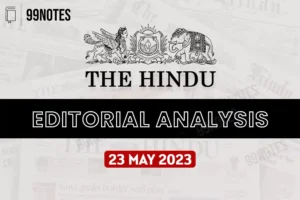
23 May 2023 : The Hindu Editorial
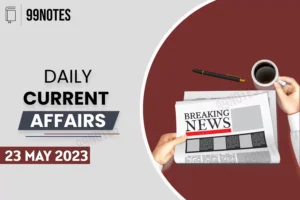
23 May 2023 : Daily Current Affairs
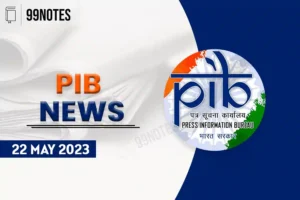
22 May 2023 : PIB
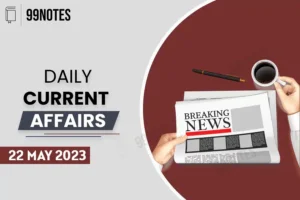
22 May 2023 : Daily Current Affairs
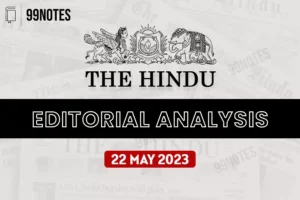
22 May 2023 : The Hindu Editorial
Daily Current Affairs 25 May 2023 : Daily Current Affairs The Hindu Editorial
12-May-2023
Daily Current Affairs For UPSC ,The Hindu Editorial Summary
Facebook-f
Twitter
Youtube
1.Marriage…
PIB 24 May 2023 : PIB PRESS INFORMATION BUREAU
24-May-2023
Daily Current Affairs For UPSC ,The PIB ( Press Information Bureau…
The Hindu 24 may 2023 : The Hindu Editorial The Hindu Editorial
24-May-2023
Daily Current Affairs For UPSC ,The Hindu Editorial Summary
Facebook-f
Twitter
Youtube…
Daily Current Affairs 24 May 2023 : Daily Current Affairs DAILY CURRENT AFFAIRS
24-May-2023
Daily Current Affairs For UPSC ,Daily Current affairs of The hIndu…
PIB 23 May 2023 : PIB PRESS INFORMATION BUREAU
23-May-2023
Daily Current Affairs For UPSC ,The PIB ( Press Information Bureau…
The Hindu 23 May 2023 : The Hindu Editorial The Hindu Editorial
23-May-2023
Daily Current Affairs For UPSC ,The Hindu Editorial Summary
Facebook-f
Twitter
Youtube…
Daily Current Affairs 23 May 2023 : Daily Current Affairs DAILY CURRENT AFFAIRS
23-May-2023
Daily Current Affairs For UPSC ,Daily Current affairs of The hIndu…
PIB 22 May 2023 : PIB PRESS INFORMATION BUREAU
22-May-2023
Daily Current Affairs For UPSC ,The PIB ( Press Information Bureau…
Daily Current Affairs 22 May 2023 : Daily Current Affairs DAILY CURRENT AFFAIRS
22-May-2023
Daily Current Affairs For UPSC ,Daily Current affairs of The hIndu…
The Hindu 22 May 2023 : The Hindu Editorial THE HINDU EDITORIAL
22-May-2023
Daily Current Affairs For UPSC ,The Hindu Editorial Summary
Facebook-f
Twitter
Youtube
1. Delhi’s…



